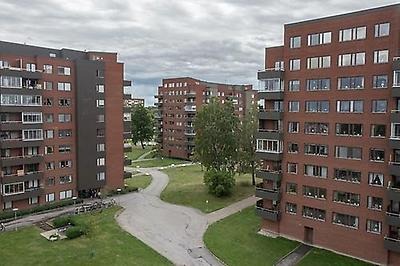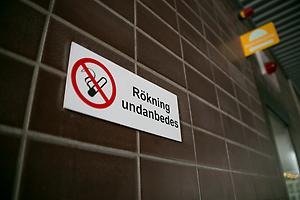Accommodation
On this page, you can read about the types of accommodation that quota refugees are offered. You will also find information about the rules that apply when living in rented accommodation.
Summary
- Your municipality will have accommodation ready for you upon your arrival. If you do not accept the offered accommodation, you will have to arrange somewhere to live yourself.
- There are different kinds of accommodation and they vary in size and condition.
- Basic equipment needed for cooking, eating, sleeping and washing is provided. The accommodation will be simply furnished, with only the most essential items.
- You must pay rent for your accommodation. You can apply for financial support to pay the rent, if necessary.
- Apartment buildings have rules that everyone in the building must follow. Make sure you are informed about the rules of your building when you move in.
- You are guaranteed accommodation during the first two years you live in Sweden. After that, you may need to apply for accommodation yourself. Apartments may be difficult to find, so make sure that you are placed in the housing queue as soon as possible.
Accommodation for quota refugees
The municipality you are moving to will arrange accommodation for you during your first two years in Sweden. Usually, you will be offered an apartment in an apartment building but you could be offered a room in a residence that you share with other people, or accommodation in a dormitory or barracks. In these cases, you will share the kitchen and bathroom with other people but have your own bed to sleep in.
Municipalities take into account, when possible, the needs and size of the family when arranging accommodation for quota refugees. Sometimes, the municipality will allow you to stay there for longer than two years. In other cases, you will have to find somewhere else to live after two years. It is important to know that there is a shortage of rental housing in Sweden. Therefore, it is recommended you start planning for your next home as soon as you have arrived.
You will only be given one offer of accommodation from your municipality. If you decline this offer, you will need to arrange your own accommodation.

Photo: Swedish Migration Agency/Björn Bjarnesjö
%20Bostad_imagebank.png)
Photo: Ulf Lundin/imagebank.sweden.se
Accommodation standard and equipment
Accommodation for quota refugees varies in terms of type, size and standard. All accommodation has electricity and indoor plumbing. The water is safe for drinking, cooking and washing. All homes are insulated and have heating systems that make it warm inside, even in winter. The homes are required to be clean, free of pests and have windows that are not damaged. The homes are equipped so you can cook, eat, sleep and take care of your personal hygiene.
The following is usually found in the homes
- beds or mattresses
- blankets and pillows
- kitchen table and chairs
- refrigerator and stove
- bathroom fittings, such as a toilet, basin and shower
- equipment for cooking simple food, such as pots, frying pans, plates and cutlery.
A TV and computer are not provided as they are not considered to be basic equipment. You can buy additional furniture and other things that you need later, but you will most likely have to save money in order to afford it.
%20DJI_0595.jpg)
Photo: Swedish Migration Agency/Björn Bjarnesjö
Renting a home
You must pay rent for your home every month. You can apply for financial support to pay the rent, if necessary. The amount you have to pay for accommodation in Sweden varies, but a large part of the financial support you receive will be used to pay rent. The amount of your rent is specified in your rental agreement. The rental agreement is a document that you sign when you move into your home. In the rental agreement, you will also find other details, such as the period of time you can stay in that accommodation and when the rent must be paid every month.
Rental companies usually have a housing queue, a waiting list for available apartments. You usually have to be in this queue for a long time before you will be offered an apartment. Therefore, it is recommended that you register with a rental company as soon as possible. For more information on how to join the housing queue, you can ask a representative from your municipality.
Common rules
In most residential buildings, there are rules that everyone must follow.
- There are rules to prevent fires. You cook on the stove and in the oven. Never leave the stove and the oven unattended. You may only grill or make up fires in designated places outside. You may light candles indoors but make sure you blow them out before leaving your home or going to sleep. Children must never play with fire, matches or lighters.
- Most rental companies do not allow smoking in their buildings and this rule applies to the apartments as well as common areas.
- Most residential buildings have rules about noise, especially in the evening and at night. The rule is that it must be quiet after a certain time in the evening and during the night.
- All housing has designated places where residents dispose of garbage. You must not leave garbage or garbage bags outside in common areas or outdoors. In Sweden, it is the norm to sort and recycle your household waste, that is, separate different waste materials.
- Many residential buildings have shared laundry rooms and washing machines that all residents may use. Usually, you must book your laundry time in advance. It is everyone’s responsibility to take care of the laundry room, and it must be left in a clean condition after it has been used.
- You are responsible for notifying the rental company if anything belonging to the apartment breaks or is damaged, for example the floor, refrigerator or a door. If you move out, the residence must be in the same condition as when you moved in. If it is not, you may be responsible for the cost of repairs.
- You are responsible for notifying the rental company if you discover pests in the home.
- When you move into your home, it is your responsibility to take care of it. If you do not follow the rules in the rental agreement or do not pay your rent on time, you may lose your home.

Sign indicating that smoking is forbidden. Photo: Swedish Migration Agency/Björn Bjarnesjö
Read more about accommodation in Sweden
Information Sverige – Living in Sweden External link, opens in new window.
External link, opens in new window.
Information Sverige – Housing External link, opens in new window.
External link, opens in new window.
%20(2)%20K%C3%B6k.jpg)
%20(2)%20Toalett.jpg)